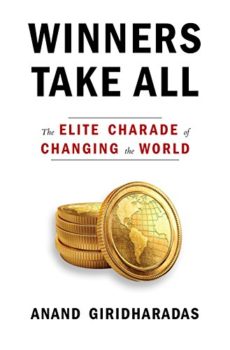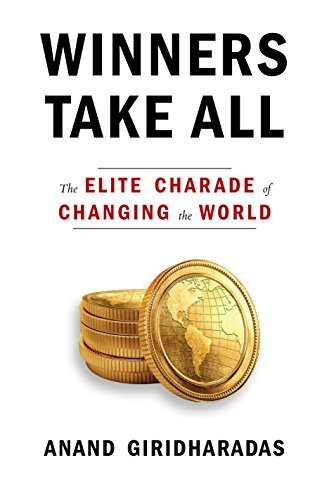
I picked up this book thinking it was about me and my friends. It’s not, though. Despite the subtitle, Winners Take All is not about the entrepreneurs and investors who are involved in socially responsible businesses whose mission is to change the world. They, I believe, are the true force for good in the world. The sole exception is the author’s brief excursion in the epilogue into the B Corporation movement, in which I’ve been involved since the beginning. And he appears not to understand what B Corps are about.
Estimated reading time: 7 minutes
“Elite-led, market-friendly, winner-safe social change”
In Winners Take All, author Anand Giridharadas zeroes in on growing economic inequality in America. As he notes at the outset, “When the fruits of change have fallen on the United States in recent decades, the very fortunate have basketed almost all of them.” His culprit? “Elite-led, market-friendly, winner-safe social change.” This is the set of beliefs held by the people who attend the World Economic Forum at Davos and gather at such other places as Aspen and the Clinton Global Initiative. In reviewing this book for the New York Times, Nobel Prize-winner Joseph Stieglitz described them as “an elite that, rather than pushing for systemic change, only reinforces our lopsided economic reality—all while hobnobbing on the conference circuit and trafficking in platitudes.” Giridharadas calls their mindset MarketWorld.
Winners Take All: The Elite Charade of Changing the World by Anand Giriharadas (2018) 304 pages ★★★★☆
“An ascendant power elite” that seeks to do good by doing well
“MarketWorld,” he explains, “is an ascendant power elite that is defined by the concurrent drives to do well and do good, to change the world while also profiting from the status quo. It consists of enlightened businesspeople and their collaborators in the worlds of charity, academia, media government, and think tanks.”
Giridharadas takes on the elite consulting firms as well, citing McKinsey and its peers in the industry as among the culprits. The values they all promote are those of the marketplace; its proponents always talk about opportunities to solve problems, never about those who are responsible for creating the problems in the first place. The author distinguishes between public intellectuals (good) and thought leaders (bad). In his view, the former are primarily academics free of commercial influences. The latter have fallen for MarketWorld values, hook, line, and sinker. And that strikes me as simplistic. It would be naive to imply that major corporations haven’t made inroads into academia.
The eight billionaires who own half the world’s wealth are an easy target
Author Anand Giridharadas aims his most powerful broadsides at easy targets such as the multimillionaire and billionaire leaders of the tech and financial industries. Can anyone seriously argue that Amazon, Google, Facebook, and Goldman Sachs are addressing the economic inequality that Giridharadas identifies as the central issue? No matter what their leaders say, they’re clearly part of the problem, not the solution.
As I write today, Jeff Bezos of Amazon can claim a net worth of $162.9 billion. Facebook’s Mark Zuckerberg is “worth” $60.4 billion. The Google guys, Larry Page and Sergei Brin, weigh in at $54.1 billion and $52.7 billion, respectively. These four men are among the eight billionaires whose collective net worth is equal to all the wealth of half of the world’s population. Yes, just eight billionaires. And Goldman Sachs possesses assets of nearly $1 trillion. How could anyone suggest that these people would even consider lobbying the federal government to adopt policies that would lessen economic inequality in America? Yet Giridharadas complains that they don’t.
Winners Take All is based on the premise that these would-be do-gooders call the shots in the American economy and dominate the political debate. The author implies that economic inequality would quickly shrink if these folks were to work for genuine social change. However, this is far from the truth. Most wealthy people in the United States are conservative Republicans who do not pretend to be change agents. And they exert far greater power and influence in American society than the Davos and Aspen set. In today’s political discourse, the Heritage Foundation and its peers among Right-Wing think tanks and the institutions of the Christian Right wield far more power in setting government policy at both the federal and state levels than the “enlightened elite” Giridharadas writes about.
Bill Clinton’s central role in making the problem immeasurably worse
In the author’s view, it’s not just clueless businessmen or Republicans who are at fault. Bill Clinton also comes in for justifiable criticism. His “Third Way” between left and right effectively reversed the Democratic Party’s commitment to helping the less fortunate in our society. Remember mass incarceration? Financial deregulation? So-called welfare “reform?” Bill Clinton institutionalized the neoliberal consensus that Ronald Reagan had brought to the White House a decade previously—and the consequences were devastating, years before Donald Trump entered the political scene. On this point, Giridharadas is right on the money. (Pun intended.)
Just for example, deregulation, including the repeal of Glass-Steagall, was among the root causes of the Great Recession that struck in 2008. Don’t forget that millions lost their homes, and millions more lost their jobs, in that calamitous economic downturn. Democrat or Republican—it doesn’t seem to matter. Not a single US President over the past half century has taken any significant step to address America’s growing inequality in wealth and income. Barack Obama was by far the best of them, but he also:
- named as his top economic advisers many of the same people whose policies in the 90s brought down the economy in the 2000s;
- prevented the prosecution of the bankers who caused the crash; and
- failed to question the prevailing bipartisan love affair with Corporate America.
Who will lead society toward viable solutions?
Here’s the crux of the matter, as Giridharadas sees it: “What is at stake is whether the reform of our common life is led by governments elected by and accountable to the people, or rather by wealthy elites claiming to know our best interests.” It doesn’t matter how well-intentioned they might make themselves out to be. If they don’t actively work to raise estate and income taxes, drive private money out of politics, provide universal free healthcare, and work to elect people committed to serving the majority of America’s people, they’re part of the problem. Nothing else they do can be a solution. And to that I say amen.
What other reviewers say about the book
- In his review of the book, Joseph Stieglitz notes that “Giridharadas is careful not to offend. He writes on two levels—seemingly tactful and subtle—but ultimately he presents a devastating portrait of a whole class, one easier to satirize than to reform.”
- Kirkus Reviews leads its commentary with this: “Give a hungry man a fish, and you get to pat yourself on the back—and take a tax deduction.” The review concludes that Winners Take All is “A provocative critique of the kind of modern, feel-good giving that addresses symptoms and not causes.”
- Writing in Forbes, B Lab co-founder and managing partner Jay Coen Gilbert terms Winners Take All a “new and important book.” Before launching into a defense of Certified B Corporations, Gilbert notes that “In provocative style and with compelling substance, Giridharadas speaks truth to power, calling elites to account for giving so much lip service to ‘changing the world,’ while mostly upholding an unacceptable status quo.”
For related reading
This is one of the Good books about billionaires.
And check out:
- The Lords of Creation: The History of America’s 1 Percent by Frederick Lewis Allen (Why the Great Recession happened—and the Great Depression before it)
- Dark Money: The Hidden History of the Billionaires Behind the Rise of the Radical Right by Jane Mayer (How the Koch brothers are revolutionizing American politics)
- Evil Geniuses: The Unmaking of America by Kurt Andersen (How America lost its way and ended up at war with itself)
- Jackpot: How the Super-Rich Really Live—and How their Wealth Harms Us All by Michael Mechanic—The curious lives of the rich and not-so-famous
This is one of the books I’ve included in my post, Gaining a global perspective on the world around us.
You might also enjoy reading my post, 7 insightful books that explain what caused the Great Recession.
Like to read books about politics and current affairs? Check out Top 10 nonfiction books about politics.
And you can always find my most popular reviews, and the most recent ones, on the Home Page.



























